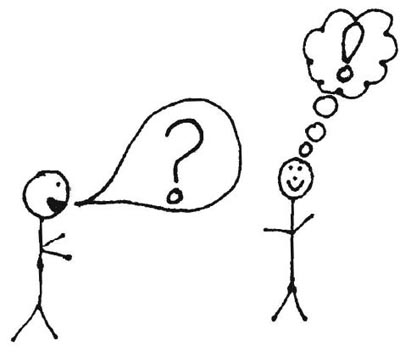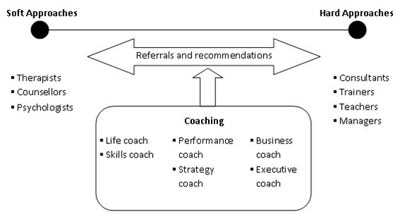Do we need coaching? When coaches manage and managers coach
Is coaching a legitimate profession? When is a coach needed? Am I a coach, or a manager who coaches? I consider responses as I coach myself through the questions.

Coming to terms with coaching
I entered into my recent Masters coaching topic with some scepticism. My perception of a coach was one who did not have the experience or academic qualifications to be a consultant or other “professional”. Thankfully, the competitive market is cleaning up the coaching industry as universities apply the rigour of psychology behind their courses.
Based on a survey of over two thousand participants, a coach is on average 48 years old. Over 60 percent of coaches have a Master’s degree or higher. Over 18 percent have a doctorate, which can be as high as 57 percent depending on the industry. Other surveys show little consistency between titles such as “life coach”, “skills coach”, or “performance coach”.
Coaching can be considered as positioned between “hard” approaches of consultants and trainers on one end and “soft” approaches of psychologists and therapists on the other. That said, there is not a clear distinction, as a psychologist can be a coach, a coach can consult, and a manager coaches as part of their role. There is also a consideration to the extent each works as the organisational or personal level.

What coaching is, and what coaching is not
Coaching is a conversation between the coach and client focused on future goals of the client. Using an approach similar to Socratic questioning, the conversation focuses on questions that use knowledge already available to the one responding.
The coach’s skill comes in their ability to ask the right question at the right time. Advice or guidance is typically in the form of models that will help the respondent reframe their thinking to arrive at the answer they require.
Different coaches can have different approaches, but many follow a path similar to the GROW mnemonic:
- Define the Goal;
- Establish Reality;
- Understand Options, Obstacles, and Opportunities; and
- Confirm the Will or Way forward.
Simply following a formula does not make one a coach. It is also important to understand what coaching is not:
- Coaching is not therapy
Therapy tends to focus on the past negatives whereas coaching focuses on future positive goals. Coaching can refer to therapy if past issues are acting as obstacles to the coaching progress. - Coaching is not mentoring
A mentor is often one experienced in areas where the client wants to succeed. A mentor may also have a vested interest in the client’s outcomes whereas a coaching relationship is focused solely on the benefit to the client. - Coaching is not consulting
Consulting is a transaction of advice from an expert. Coaches can offer advice from specialist knowledge, but that advice in itself is not the focus.
Conflicts with a manager coaching
Managers coach as part of their role, depending on the inclination of the manager. That said, I find coaching as a manager can be problematic from a few areas:
- Conflict of interest
As a manager, my emphasis is on the performance of my respective teams. As a coach, I ask questions that help the individual realise their full potential. If that potential is at odds with team performance, I need to decide if I am a manager or a coach. - Embedding a model
I recorded a coaching session with one of my staff as part of my course. We had performed ad hoc coaching sessions in the past, but the session felt artificial as I walked through the paces of a model not my own. If a manager is to coach, external training is likely required. - Authenticity and training the client
As soon as some of my staff knew I was doing a coaching course, I got tongue-in-cheek questions of “Are you coaching me?” You cannot sneak coaching into the management relationship. A coaching program needs to be supported by training for not only the coaches, but for the staff being coached so they can get the most from the experience. - Not providing the answer
My inclination as a manager is to fix the problem. Coaching is all about empowering the client to arrive at the solution themselves. This makes it difficult when I need to ask a question to which I feel I already have the answer. It is especially challenging when I have a vested interest in the response.
Do you need a coach?
Formally engaging with a coach requires admitting you are unable to get to where you want to go with your current frame of reference. This awareness can be both humbling and liberating. I personally feel that if proven business leaders and sports stars use coaches, who am I to say I could not use the help?
My company engaged organisational coaches a few months back to help us with the transition towards advanced growth. We acknowledged we are exceptional at delivering digital solutions. None of us, however, have taken a digital company from 10 to 50 people in a short time frame. So we engaged with someone who had related experience and could help develop the wider team into the kind of people who could sustain the growth pattern we are experiencing.
As part of the process, I have also engaged in a personal coach to work through the process from an individual perspective. Challenges expose pressure points in both organisations and individuals. Coaches identify those pressure points that we often cannot see ourselves.
There are countless and continuous market examples of leaders getting taken out by personal challenges. Our culture will maintain a high personal and professional standard for our leaders and organisations. In a paradox of humble confidence, leaders who engage with coaches can acknowledge that they do not have all the answers by allowing someone to show them how to succeed with knowledge they already have.
